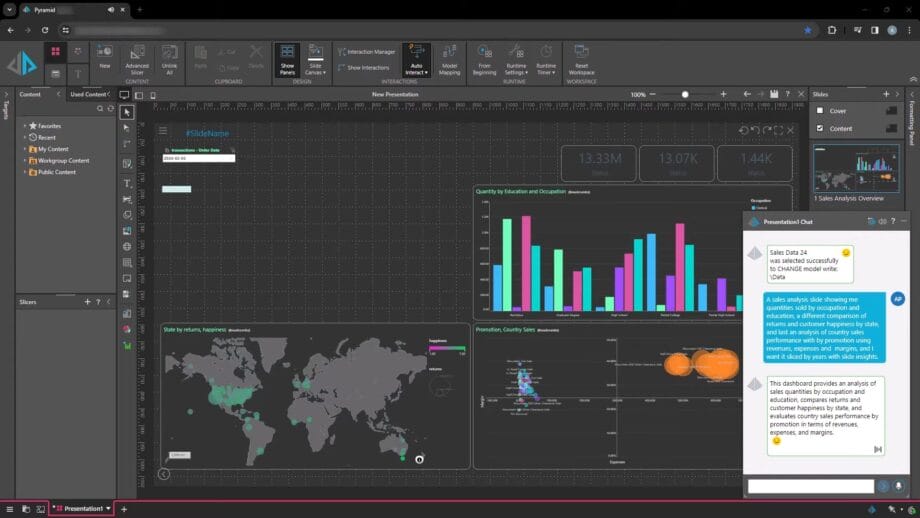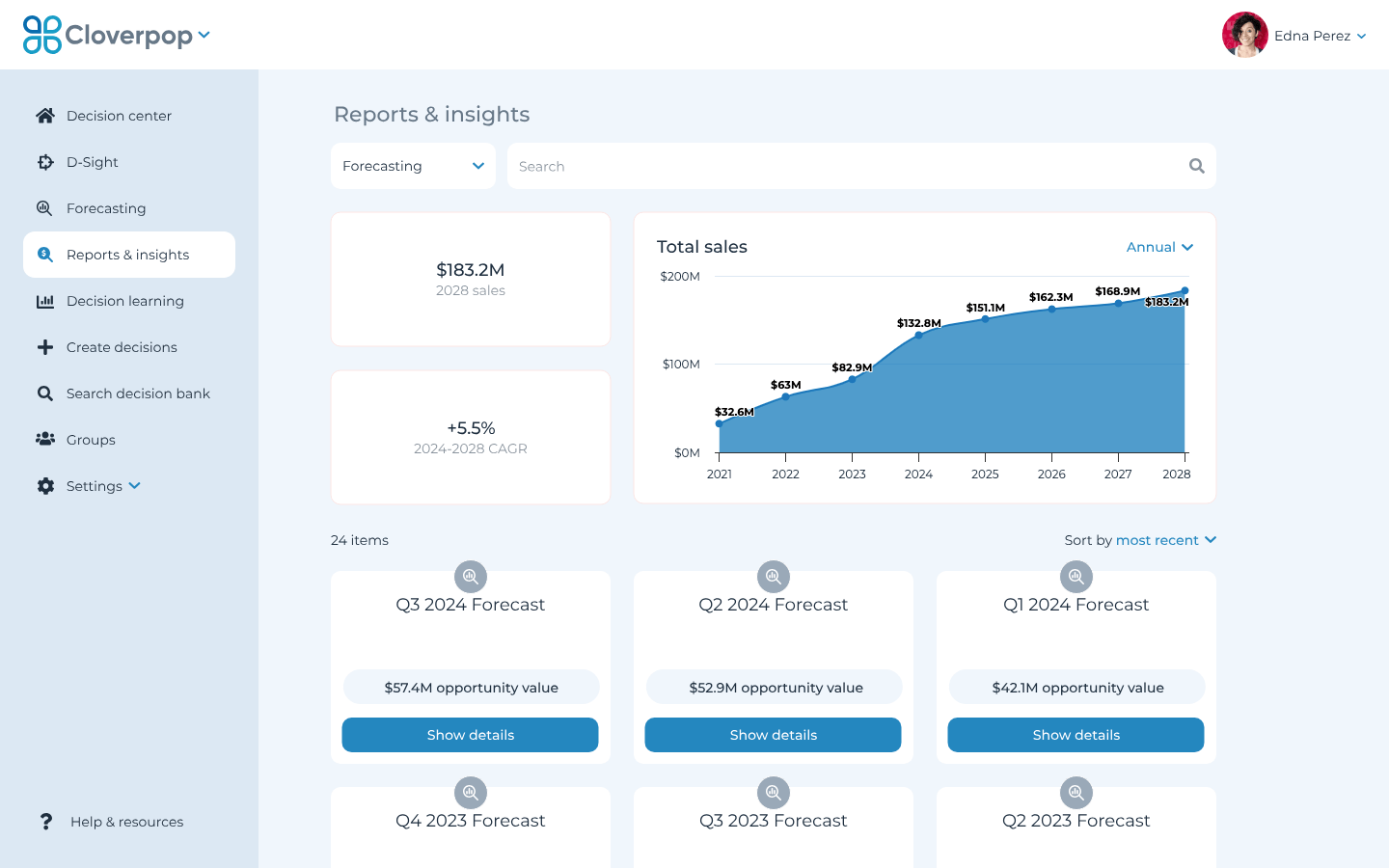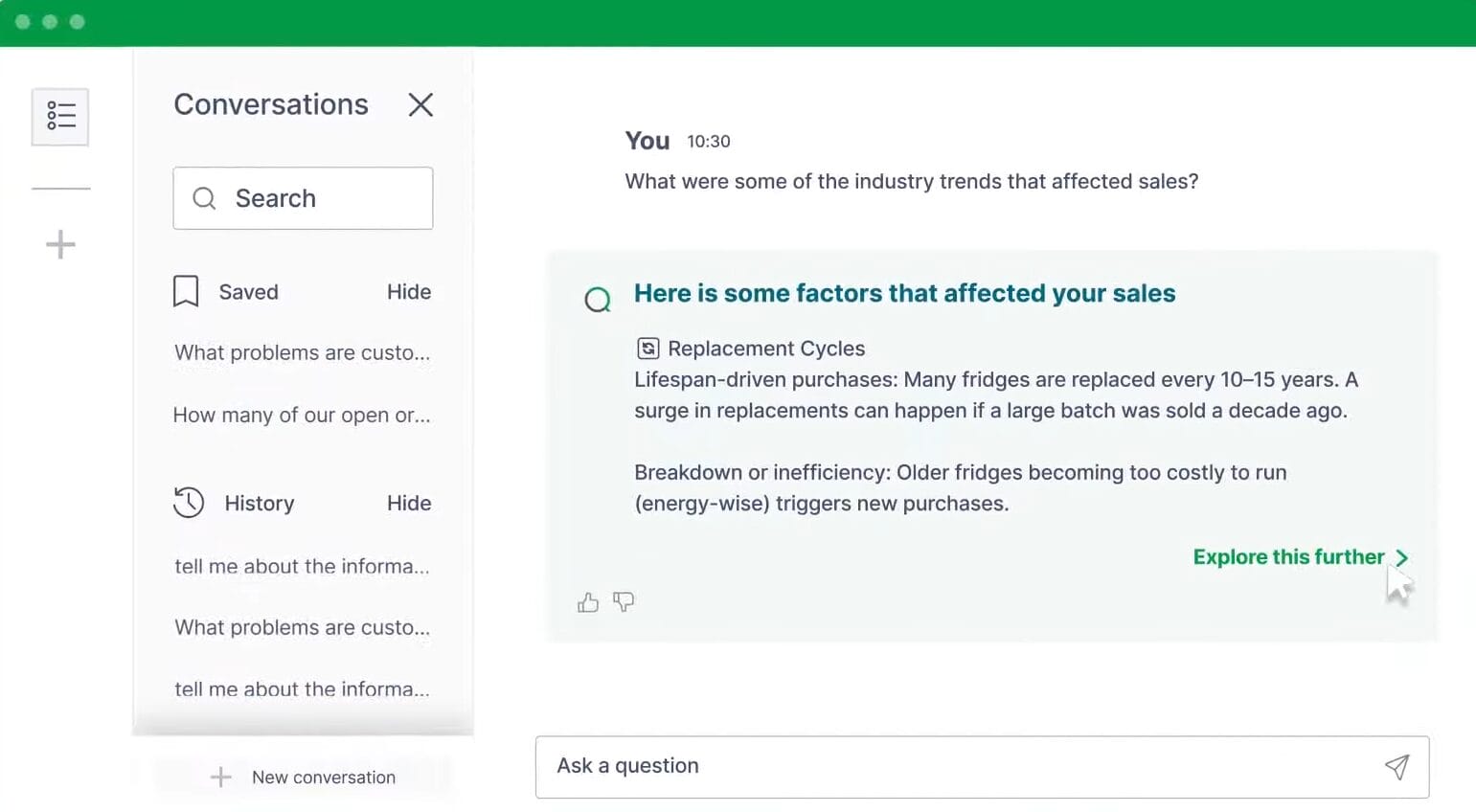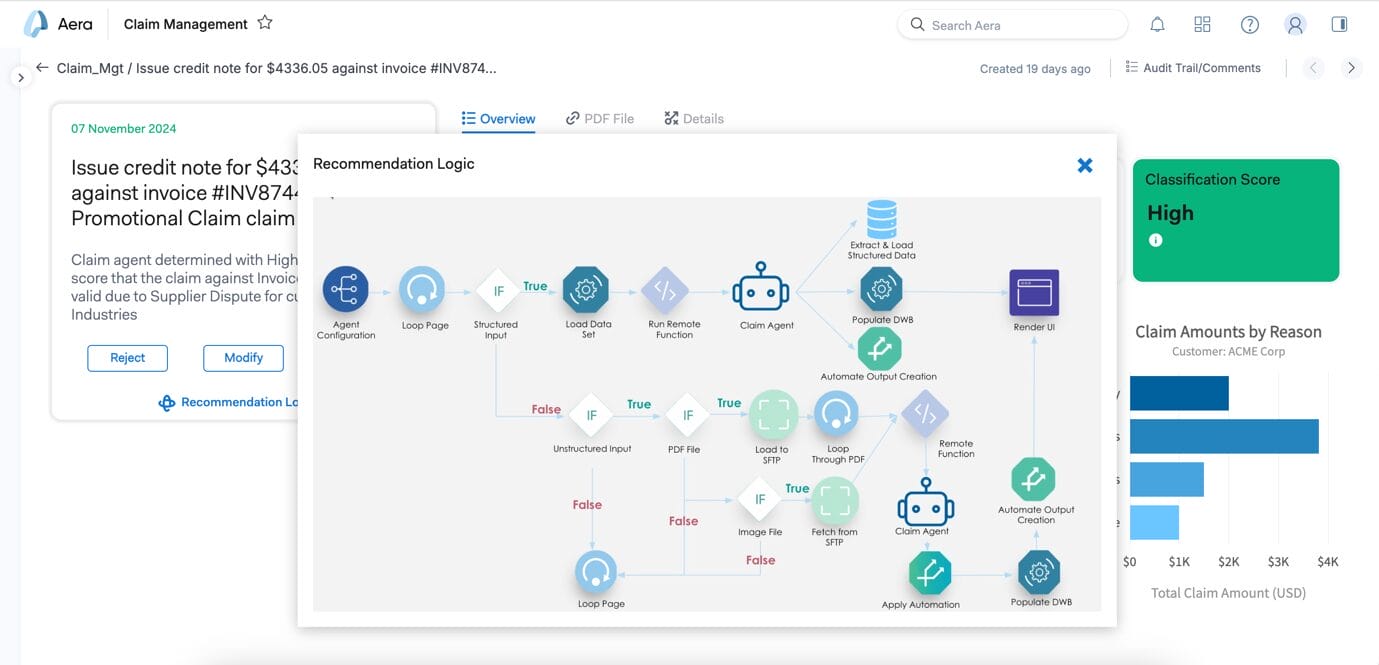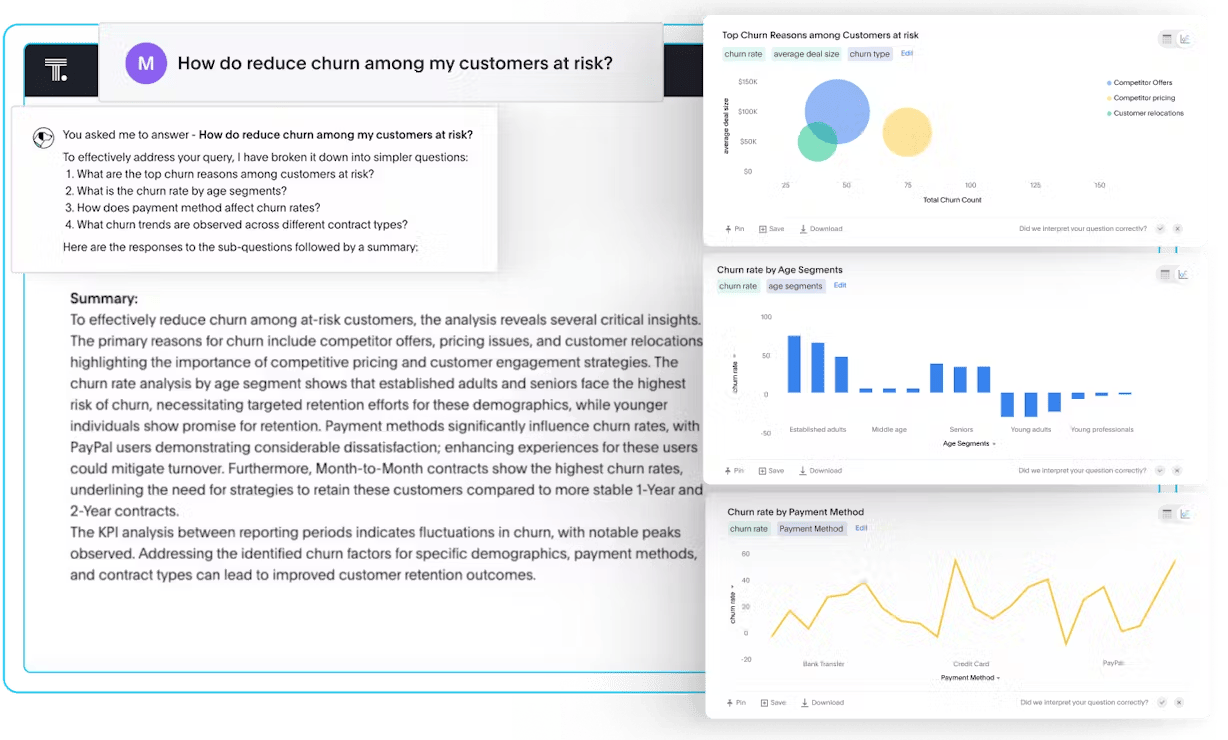Decision intelligence (DI) solutions offer data-driven, actionable insights to help business professionals make accurate strategic moves quickly.
DI platforms combine data analytics, machine learning, and business logic to suggest steps forward. Teams can leverage them to make effective decisions swiftly, improving responsiveness to evolving market conditions.
Fortunately, there are plenty of DI options for today’s enterprises that cater to various needs. They differ based on their core functionalities, industry specialization, user experience, and tech specifications (deployment model, integrations, etc.).
In this article, let’s look at the five best decision intelligence solutions for data-driven strategic agility in 2025.
Top 5 Decision Intelligence Solutions in 2025
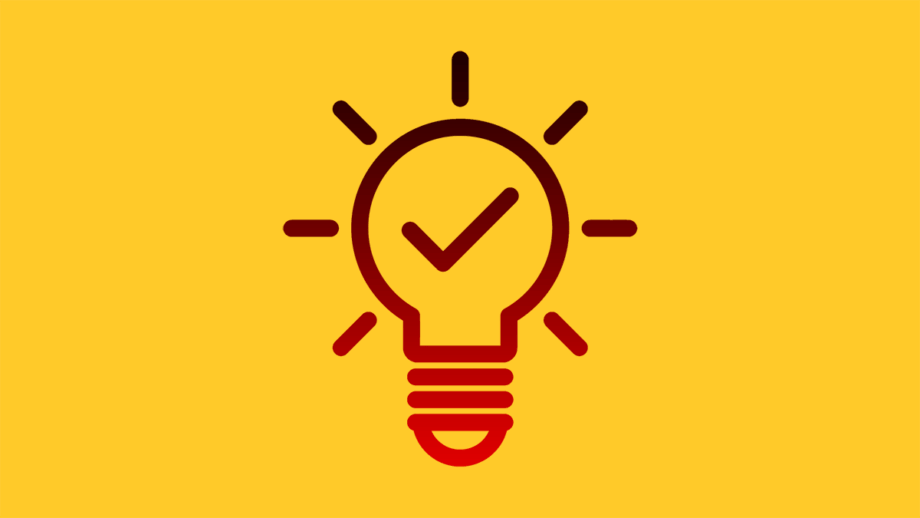
| Vendor | Best for | Specializes in | Pricing | Ratings |
| Pyramid Analytics | Enterprises with complex data infrastructures needing scalable DI | Conversational DI via GenBI and automated insights | Depends on enterprise needs | G2: 4.1/5 (17 reviews); Gartner: 4.4/5 (282 reviews) |
| Cloverpop | Standardizing high-stakes decision-making workflows | AI agents aiding human-driven DI processes | Depends on business needs | G2: 4.5/5 (16 reviews); Gartner: 4.8/5 (18 reviews) |
| Qlik Answers | Analyzing unstructured data with GenAI | Plug-and-play RAG assistants for specified datasets | Starts at $825/month | G2 (Qlik Sense suite): 4.4/5 (919 reviews); Gartner: 4.3/5 (6 reviews) |
| Aera | Global enterprises in supply chain and finance | Real-time DI with AI agents and packaged Skills | Depends on business needs | G2: 4.1/5 (5 reviews); Gartner: 4.8/5 (18 reviews) |
| ThoughtSpot | Scalable embedded analytics solutions | LLM-powered DI with real-time Liveboards | Starts at $25/user/month (annual) | G2: 4.4/5 (317 reviews); Gartner: 4.6/5 (411 reviews) |
1. Pyramid Analytics
Best for: Enterprises with complex data infrastructures that need a scalable DI solution.
Specializes in: Conversational DI through a no-code AI layer (GenBI) and automated insights.
Key features:
- PYRANA direct query: Analyze data directly on your organization’s servers without data migration.
- Embeddable analytics: Add conversational analytics interfaces to your apps using deep integrations.
- AI-assisted analytics: Leverage the LLM of your choice to ask questions in plain English and receive actionable insights.
- 250+ native connectors: Integrate with existing data warehouses or live sources seamlessly.
Pricing: Depends on the custom needs of enterprises.
Pyramid Analytics combines AI-assisted data prep, analytics, distribution, and governance into one flexible and scalable platform. Professionals can connect it to existing warehouses and lakes through PYRANA, which minimizes data movement and latency to improve DI performance.
Teams can simulate scenarios to predict outcomes right from their dashboards. This democratizes analytics for everyone, including non-technical stakeholders. Consequently, businesses accelerate time-to-insight, enabling live, governed, and data-backed decision-making.
The industry-leading DI solution is rated 4.1/5 on G2 (17 reviews) and 4.4/5 on Gartner (282 reviews). The seamless setup experience, custom dashboards, powerful “metrics layer”, and responsive support from Pyramid make it a top choice for business executives across industries.
Enterprises might need a while to fully explore the platform’s wide range of capabilities and incorporate them into their decision-intelligence processes.
2. Cloverpop
Best for: Organizations looking to standardize their high-stakes decision-making workflows.
Specializes in: AI agents that aid human-driven DI processes.
Key features:
- Decision Playbooks: Guides to build custom DI flows.
- Decision Bank: Keep a record of past decisions and their rationale.
- D-Sight Engine: Get actionable recommendations based on private commercial data.
Pricing: Depends on the custom needs of businesses.
Cloverpop streamlines the entire decision lifecycle through AI-enabled workflows that recommend next steps to support the organization. The DI model of this solution promises to help businesses make decisions up to 4x faster.
Additionally, professionals can build institutional knowledge with Decision Bank to make better calls down the line. This makes the tool much more collaborative, facilitating transparent discussions among stakeholders.
The DI solution is rated 4.5/5 on G2 (16 reviews) and 4.8/5 on Gartner (18 reviews). However, users have reported that Cloverpop can be hard on the budget, considering the limited customization options.
3. Qlik Answers
Best for: Companies that need to analyze unstructured data with GenAI.
Specializes in: Plug-and-play RAG assistants that work on specific datasets.
Key features:
- Curated knowledge bases: Run analytics on PDFs, docs, and sites.
- Explainability: The AI cites its sources when providing insights.
- Quick setup: Launch a custom assistant for your team within hours.
Pricing: Starts at $825/month.
Offered with Qlik Cloud, Qlik Answers gives business users personalized, data-backed answers from unstructured data using RAG. Simply put, it gives teams a custom AI chatbot that has access to their private organizational data.
The ease of use and strong visualizations are two key advantages of this DI tool. Moreover, professionals can extract more from the platform through community resources. The entire suite, Qlik Sense, is rated 4.4/5 on G2 (919 reviews), but Qlik Answers is rated 4.3/5 on Gartner (6 reviews).
Note that Qlik Answers is a part of Qlik Cloud’s suite.
4. Aera
Best for: Global enterprises in industries like supply chain and finance.
Specializes in: Real-time DI, powered by AI agents and packaged Skills.
Key features:
- Decision data model: Provides labeled datasets in real-time for DI.
- Agentic AI: Engage with business data conversationally.
- Simulation and planning: Forecasts future outcomes of initiatives.
Pricing: Depends on the custom needs of businesses.
Aera is positioned as a virtual analyst that aggregates data from multiple sources, recommends future actions, and learns from past decisions. The DI platform stores all the relevant details with context to serve as an institutional knowledge library.
The platform’s what-if simulations in low-code environments make it easier for professionals to visualize the potential results of their actions. On top of this, the tool’s drill-down analysis capabilities and strong customer support can make it a great option.
Although Aera offers low-code simulations, its breadth can create a steeper learning curve for new teams. Additionally, the tool is fairly limited in terms of its capabilities. The platform is rated 4.1/5 on G2 (5 reviews) and 4.8/5 on Gartner (18 reviews).
5. ThoughtSpot
Best for: Teams looking for scalable embedded analytics solutions.
Specializes in: LLM-powered DI with interactive Liveboards that show real-time data.
Key features:
- Spotter AI Analyst: Choose a preferred LLM and get explainable answers from custom datasets.
- Liveboards: Real-time dashboards that monitor any KPI with drill-down analysis capabilities.
- Compliance: Row-level security, SSO, and multi-tenant options for businesses in regulated industries.
Pricing: Starts at $25/user per month when billed annually.
ThoughtSpot’s agentic AI capabilities provide actionable insights in a conversational interface that cites underlying sources and context. Teams can view all the relevant metrics, graphs, or charts when evaluating the DI platform’s output to guide their decision-making process.
This platform is known for its ease of use, quick insights feature, and robust AI functions that deliver consistent performance. It is rated 4.4/5 on G2 (317 reviews) and 4.6/5 on Gartner (411 reviews).
However, it does have limited app customization options, which may not fit every team’s needs. At the same time, the pricing makes ThoughtSpot accessible for growing or budget-constrained enterprises.
How to Choose the Right DI Tool for You

1. Recognize Your Decision Needs
The first step is to identify the types of data-informed decisions that people in your organization need to make. They can be related to logistics, such as reloading stocks, or strategic, such as running ads for a particular demographic.
This will allow you to find the DI solution that specializes in that type of decision-making. ML algorithms that power DI platforms are usually built to serve specific purposes, such as supply chain or finance management.
2. Look for Key Capabilities
Enterprises have a list of “must-have” features. They can include AI-driven recommendations, multiple LLM options, citation/traceability features, and predictive analytics. On top of that, look at integration capabilities.
DI tools that come with built-in integrations for prevalent enterprise software can be easily adopted.
3. Check Governance and Compliance
DI platforms influence critical decisions, such as hiring and vendor deals, making governance critical. Good governance ensures that the ML algorithms and LLMs are transparent, ethical, and accountable.
Furthermore, the platform you select should offer enterprise-grade data controls, audit trails, and bias detection when suggesting actionable insights or predicting future results. All of these guardrails earn stakeholders’ trust, accelerating the adoption of DI platforms in various decision-making processes.
4. Run Pilot Programs to Assess Fit
Pilot tests provide your team with a reality check on how the chosen DI solution might perform. It will give an idea about user-friendliness, compatibility, accuracy, and scalability. This is pivotal to assessing the ROI of the DI platform.
During these evaluations, monitor setup time, decision accuracy, and user feedback to gauge the effectiveness of these tools.
Wrapping Up

Decision intelligence (DI) platforms are now essential for businesses and enterprises to maintain strategic agility. These solutions quickly analyze vast, diverse sets of data to provide actionable insights, shaping smarter decisions.
The top tools you might consider include Pyramid Analytics, Cloverpop, Qlik Answers, Aera, and ThoughtSpot.
These DI platforms cater to various kinds of decision-making applications for enterprises. For instance, brands looking for scalable and comprehensive DI solutions may go with Pyramid, while teams that want AI assistants to make sense of unstructured datasets may consider Qlik Answers.
When selecting a platform, it’s pivotal that organizations identify their requirements from DI tools in their decision-making workflows. It can be helpful to test finalists in pilot projects to accurately assess their value and fit.
FAQs

What is the difference between decision intelligence and business intelligence?
Business intelligence (BI) primarily surfaces descriptive dashboards that help professionals understand market trends and make decisions. Decision intelligence (DI) goes a step further by suggesting decisions and simulating potential outcomes. DI combines analytics, AI, and business logic to guide strategic decisions in real-time.
How does decision intelligence ensure fair and transparent decisions?
Leading DI platforms ensure fairness and transparency through explainable AI models, audit trails, and bias detection. This empowers users to look “under the hood” to understand how these solutions recommend strategic solutions.
Do I need data analytics skills to use a DI platform?
Modern DI solutions are designed for business users, not just professionals with data analytics skills. For instance, Pyramid Analytics, one of the best DI tools for enterprises, democratizes decision intelligence through an LLM-driven, conversational analytics interface.
What types of decisions are best suited for DI?
Typically, DI is ideal for data-rich decisions in areas such as supply chain, sales management, dynamic pricing, and revenue forecasting. These tools make it easy to segment historical data and simulate what-if outcomes, helping teams evaluate alternatives and make the right calls.
